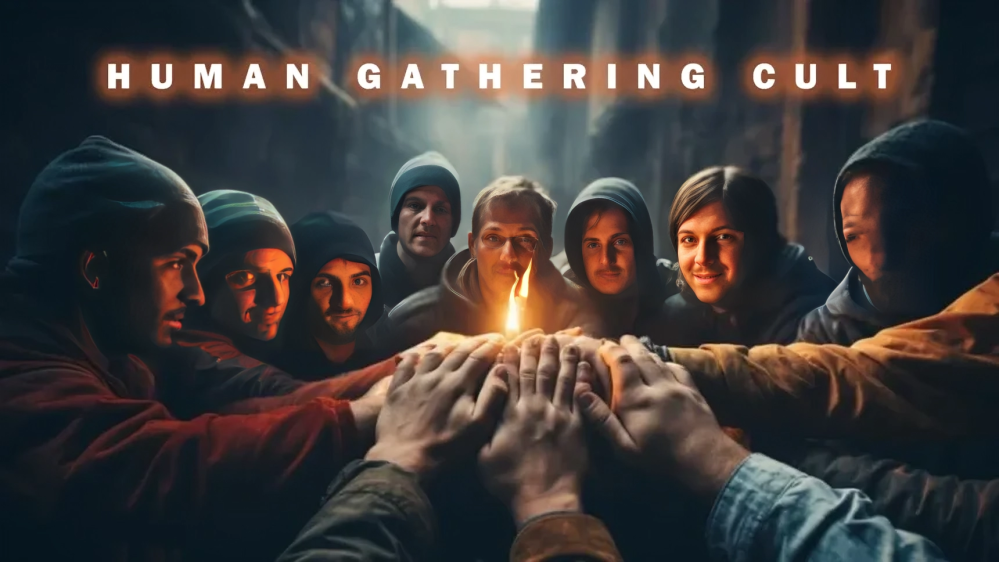General
Human Gathering Cult: Exploring Beliefs, Psychology, and Social Dynamics

Throughout history, human gathering cults have captivated the imagination and curiosity of societies across the globe. These groups, often shrouded in mystery and misunderstanding, represent a fascinating intersection of belief, tradition, and human psychology. A human gathering cult is typically formed around shared ideologies, rituals, or charismatic leaders that unify its members. From ancient religious sects to modern spiritual movements, the phenomenon continues to shape cultures, influence behaviors, and raise questions about the nature of human belief.
Whether viewed as a force for good or a vehicle for manipulation, human gathering cults often reflect deeper societal needs—offering a sense of belonging, purpose, and identity to their followers. By examining their origins, characteristics, and impact on society, we can better understand the allure and complexity of these groups.
What Defines a Human Gathering Cult?
At its core, a human gathering cult is a group of individuals united by a shared belief system, often centered around a set of rituals, doctrines, or a charismatic leader. While the term “cult” often carries negative connotations, not all cults are harmful or destructive. Many begin as movements with idealistic goals or philosophical underpinnings.
A cult differs from mainstream religious or social groups in its exclusivity, intense devotion, and, in some cases, its hierarchical structure. Members are often encouraged to prioritize the group over external relationships, reinforcing loyalty and solidarity within the collective.
The Origins of Human Gathering Cults
The concept of cults is not new; they have existed for thousands of years, evolving alongside human civilization. Ancient history is replete with examples of human gathering cults that worshiped deities, revered nature, or followed enigmatic leaders.
In ancient Egypt, cults centered around gods like Osiris and Ra, blending mythology with societal rituals. Similarly, in ancient Greece, the Eleusinian Mysteries—a cult dedicated to Demeter and Persephone—offered initiates secret knowledge and spiritual enlightenment. These early cults provided a framework for understanding the world and served as a means of community bonding.
Modern cults often emerge during times of social upheaval or uncertainty, when people seek answers, stability, or a sense of belonging. They may revolve around spirituality, political ideologies, or even conspiracy theories, reflecting the evolving needs and fears of society.
The Psychology Behind Human Gathering Cults
To understand why people join cults, it is essential to explore the psychological factors at play. Cults tap into fundamental human needs, including:
- Belonging: Humans are inherently social creatures. A cult provides a sense of community and acceptance, particularly for individuals who feel isolated or marginalized.
- Purpose: Cults often promise meaning and direction, filling existential voids with a clear mission or ideology.
- Certainty: In a chaotic world, cults offer simple answers to complex questions, creating an illusion of control and order.
- Charismatic Leadership: A compelling leader who exudes confidence and charisma can inspire devotion and loyalty, even in the absence of logical reasoning.
- Manipulative Techniques: Many cults employ psychological strategies such as love-bombing (excessive attention and praise), groupthink, and fear tactics to influence and retain members.
Characteristics of a Human Gathering Cult
While every cult is unique, there are common characteristics that many share:
- Devotion to a Leader or Doctrine: Members often display unwavering loyalty to a leader or belief system, viewing them as infallible.
- Rituals and Symbols: Cults frequently use rituals, ceremonies, and symbols to reinforce their identity and establish a sense of unity.
- Isolation from Society: To maintain control, cults may isolate members from outside influences, discouraging contact with non-members.
- Us vs. Them Mentality: Cults often portray the outside world as dangerous or corrupt, further solidifying group cohesion.
- Financial or Emotional Exploitation: Some cults manipulate members into making significant financial contributions or sacrificing personal well-being for the group’s benefit.
Notable Examples of Human Gathering Cults
History has witnessed numerous examples of cults, some of which have had profound cultural or societal impacts:
- The People’s Temple (Jonestown): Led by Jim Jones, this cult tragically ended in the mass suicide of over 900 members in 1978.
- Heaven’s Gate: A UFO-based cult whose members believed in ascending to an extraterrestrial plane, culminating in a mass suicide in 1997.
- The Branch Davidians: This religious sect, led by David Koresh, was involved in a deadly standoff with U.S. federal agents in Waco, Texas, in 1993.
- The Church of Scientology: Though controversial, this organization continues to attract followers with its blend of self-help principles and spiritual practices.
Positive Aspects of Human Gathering Cults
While the term “cult” often evokes fear and negativity, not all cults are harmful. Some groups foster personal growth, spiritual exploration, and social connection. For instance:
- Yoga and Meditation Cults: These groups promote mental and physical well-being, emphasizing mindfulness and self-awareness.
- Environmental Movements: Some eco-centric cults advocate for sustainability and environmental preservation, inspiring positive change.
- Philosophical Communities: Groups centered around philosophical teachings can offer intellectual stimulation and moral guidance.
It is essential to distinguish between cults that harm their members and those that serve as benign communities of shared interest.
The Impact of Human Gathering Cults on Society
Cults often have a polarizing effect on society. On the one hand, they challenge mainstream beliefs, spark thought-provoking debates, and provoke cultural dialogue. Additionally, they can provide alternative perspectives that push the boundaries of conventional norms. On the other hand, however, destructive cults can cause significant harm—psychological, financial, and even physical—to their members and their loved ones.
In certain cases, cults have undeniably contributed to societal progress by introducing innovative ideas, questioning oppressive systems, and fostering unity among marginalized or disenfranchised groups. Nevertheless, they can just as easily exploit vulnerabilities, perpetuate abuse, and disrupt communities, often leaving lasting scars on individuals and society as a whole.
How to Identify and Avoid Harmful Human Gathering Cults
If you suspect a group might be a harmful cult, consider the following warning signs:
- Excessive control over members’ lives, including their relationships, finances, and daily routines.
- Pressure to isolate from friends, family, or society.
- Charismatic leaders who demand unquestioning loyalty or portray themselves as divine.
- Fear-based tactics, such as threats of punishment or eternal damnation, to maintain control.
- Emotional manipulation through guilt, shame, or promises of salvation.
To avoid harmful cults, remain critical and question any group that discourages independent thinking. Seek multiple perspectives, and don’t hesitate to consult trusted friends, family, or professionals for advice.
Why Do Human Gathering Cults Persist?
Despite the risks, cults continue to attract followers because they address universal human needs—connection, purpose, and identity. Moreover, the sense of belonging they provide can be incredibly powerful, especially during times of social isolation or uncertainty. In addition, they often appeal to individuals seeking solace or clarity in an increasingly complex world.
Furthermore, cults adapt to societal changes, effectively leveraging modern technology, social media, and cultural trends to recruit members. For instance, some contemporary cults strategically use online forums to spread their ideologies. As a result, they are able to target vulnerable individuals who are actively searching for community, guidance, or answers.
The Role of Media in Shaping Perceptions of Human Gathering Cults
Media coverage has played a significant role in shaping public perceptions of cults. Sensationalist reporting often focuses on extreme cases, reinforcing the idea that all cults are dangerous. While this narrative raises awareness of potential dangers, it can also stigmatize groups that operate peacefully.
Balanced media representation is essential to distinguish between harmful and benign cults, fostering informed discussions about their societal role.
FAQs
What is a human gathering cult?
A human gathering cult is a group of individuals united by a shared belief system, often characterized by intense devotion, rituals, and hierarchical structures.
Are all cults harmful?
No, not all cults are harmful. Some promote personal growth, spiritual exploration, or social connection, while others may exploit and manipulate their members.
Why do people join cults?
People join cults for various reasons, including a desire for belonging, purpose, certainty, or guidance. Charismatic leaders and psychological tactics often play a significant role.
How can harmful cults be identified?
Warning signs include excessive control, isolation from society, fear-based tactics, and emotional or financial exploitation.
What impact do cults have on society?
Cults can provoke cultural dialogue, introduce innovative ideas, or foster unity. However, destructive cults may cause psychological, financial, or physical harm.
Can modern technology influence cult recruitment?
Yes, contemporary cults often use social media and online forums to recruit members, targeting vulnerable individuals who seek community or answers.
What should I do if I suspect someone is involved in a harmful cult?
Encourage open communication and provide support without judgment. Consider seeking professional advice from a counselor or cult expert.
Conclusion
The phenomenon of the human gathering cult offers valuable insights into the complexities of human behavior, belief systems, and societal dynamics. While some cults can provide a sense of purpose and community, others exploit vulnerabilities and inflict harm. By understanding their origins, psychology, and impact, we can navigate this intricate topic with greater awareness and empathy.
As society evolves, the role of cults will continue to adapt, reflecting the ever-changing needs and fears of humanity. By fostering critical thinking and open dialogue, individuals can make informed choices about the communities they choose to join or support.

General
Fintechzoom.com Loans: Unlocking Smart Borrowing Choices

Understanding Fintechzoom.com Loans for Smarter Financial Decisions
Fintechzoom.com loans have significantly transformed the borrowing experience, making it much easier for individuals to secure funding for various needs. Since financial technology has rapidly evolved, traditional lending processes have changed. As a result, loan approvals are now quicker, interest rates have become more competitive, and repayment plans offer greater flexibility. Therefore, understanding these loan options is crucial for making well-informed financial decisions.
Personal Loans: A Versatile Borrowing Solution
A personal loan is one of the most flexible borrowing options, mainly because it can be used for almost anything. Whether consolidating high-interest debts, covering emergency expenses, or financing a home improvement project, this type of loan remains a practical choice. Furthermore, most personal loans are unsecured, meaning borrowers do not need to provide collateral. Consequently, lenders evaluate credit history, income stability, and debt-to-income ratio before granting approval. Hence, comparing different offers is essential to securing the best terms.
Mortgage Loans: Turning Homeownership into Reality
For many, buying a home is a major financial milestone. Because homes are expensive, mortgage loans play a vital role in making homeownership attainable. Generally, these loans are secured by the property itself, ensuring that lenders have collateral. Additionally, there are multiple mortgage options, including fixed-rate and adjustable-rate mortgages. Since both types have advantages and disadvantages, borrowers must carefully consider their long-term financial goals before choosing one. To illustrate, a fixed-rate mortgage provides predictable payments, whereas an adjustable-rate mortgage may offer lower initial rates but fluctuate over time.
Auto Loans: Financing Your Vehicle Purchase
Auto loans provide individuals with the means to purchase a vehicle while spreading the cost over manageable monthly payments. Because vehicles are essential for commuting, financing options have become more accessible. Typically, lenders determine loan terms based on factors such as credit score, income, and the vehicle’s value. Moreover, securing pre-approval before visiting a dealership can strengthen a buyer’s negotiating power. Since auto loans vary in terms and interest rates, shopping around for the best deal is always a wise decision.
Student Loans: Investing in Education
Pursuing higher education requires a substantial financial commitment, which is why student loans exist. Unlike personal loans, student loans are specifically designed to cover tuition fees, books, and living expenses. Moreover, there are two main types: federal and private student loans. Because federal loans typically have lower interest rates and more flexible repayment plans, they are often preferred. Meanwhile, private student loans may require higher credit scores but can provide additional funding when federal aid falls short. Therefore, students should explore all options before taking on long-term debt.
Navigating the Loan Application Process
Applying for a loan requires careful planning to ensure approval and secure favorable terms. Since different lenders have unique requirements, following these steps can improve the chances of success:
- Assess Financial Situation: Before applying, individuals should evaluate their income, credit score, and current debt levels to determine how much they can afford to borrow.
- Research Lenders: Because not all lenders offer the same terms, comparing multiple options is necessary to find the most competitive rates and fees.
- Prepare Documentation: Most lenders require proof of income, credit reports, and identification, so gathering these documents beforehand can streamline the process.
- Submit Application: Once prepared, submitting an application accurately is crucial for avoiding delays or rejections.
- Review Loan Agreement: Since loan terms may contain hidden fees, reading and understanding the agreement before accepting the loan is essential.
The Role of Credit Scores in Loan Approval
A credit score plays a pivotal role in determining loan eligibility and interest rates. Because lenders use this number to assess financial responsibility, maintaining a high score is advantageous. To improve credit scores, individuals should:
- Make timely payments on all credit accounts.
- Keep credit card balances low to maintain a good credit utilization ratio.
- Avoid excessive loan applications, as multiple inquiries can lower scores.
- Regularly review credit reports to identify and dispute any inaccuracies.
Understanding Interest Rates and APR
When borrowing money, understanding the cost of the loan is just as important as securing approval. While the interest rate represents the percentage charged on the principal amount, the Annual Percentage Rate (APR) includes both interest and additional fees. Consequently, the APR provides a more accurate measure of a loan’s true cost. Since lower APRs reduce overall expenses, comparing APRs rather than just interest rates is always recommended.
Loan Repayment Strategies
Successfully managing loan repayments requires careful planning and disciplined financial habits. Because missing payments can lead to penalties and damage credit scores, these strategies can help borrowers stay on track:
- Create a Budget: Allocating funds for loan payments within a monthly budget prevents financial strain.
- Set Up Automatic Payments: Scheduling automatic deductions ensures payments are made on time, reducing the risk of late fees.
- Pay More Than the Minimum: Contributing extra toward the principal can shorten the repayment period and lower interest costs.
- Consider Refinancing: If interest rates decrease, refinancing to a lower-rate loan can reduce monthly payments and total interest paid.
Potential Pitfalls to Avoid
Although loans provide financial relief, several mistakes can lead to unnecessary debt. To avoid common pitfalls, borrowers should:
- Not Overborrow: Taking out more than necessary increases debt burden and repayment difficulties.
- Understand Loan Terms: Some loans come with hidden fees or penalties, so reviewing terms thoroughly prevents surprises.
- Compare Offers: Failing to shop around may result in higher interest rates and unfavorable conditions.
Conclusion
Fintechzoom.com loans provide valuable financial opportunities, enabling individuals to achieve their personal and professional goals. Because various loan options cater to different needs, understanding their features, eligibility criteria, and repayment terms is essential. Ultimately, making informed choices ensures financial stability and long-term success.
-

 Blog3 months ago
Blog3 months ago鲁Q 669FD: Understanding Vehicle Registration in China
-

 Blog3 months ago
Blog3 months agoSwatapp.me المانجا: Your Gateway to the World of Manga
-
Tech6 months ago
IPv6 Internet Is Broken
-

 Tech2 months ago
Tech2 months agoWepbound: The Future of Web Development
-

 Business4 days ago
Business4 days agoUnveiling adsy.pw/hb3: Revolutionizing Content Marketing Strategies
-

 Tech5 months ago
Tech5 months agoScamalytics: Revolutionizing Scam Detection in the Digital Age
-

 Tech5 months ago
Tech5 months agoWebmxhd: Revolutionizing Digital Connectivity
-

 Health3 months ago
Health3 months agoprostavive colibrim Benefits, Uses, and How It Works





